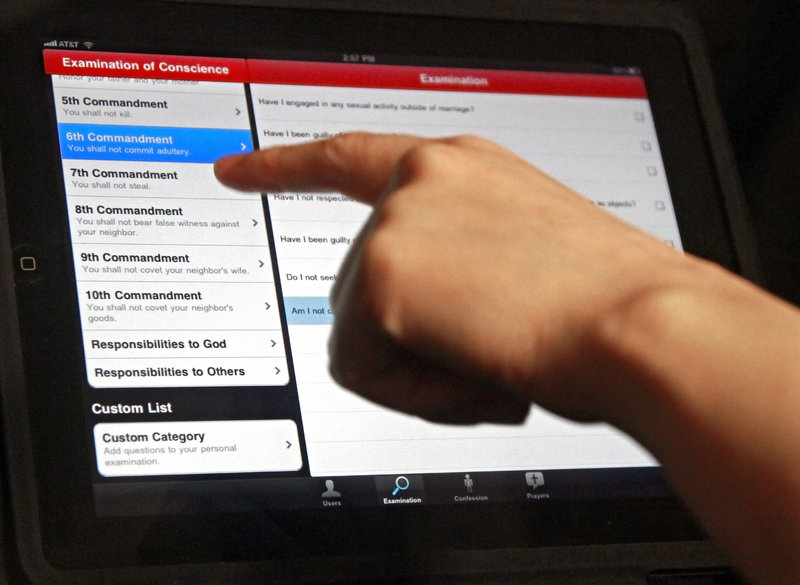SOUTH BEND, Ind. – Can your iPad or iPhone bring you closer to God? A new application for the devices aims to help Roman Catholics who haven’t been to the confessional booth in a while keep track of their sins, one Commandment at a time.
The $1.99 “Confession: A Roman Catholic App” can’t grant forgiveness — you still need to receive the sacrament from a real, live priest like always. The app’s designers and some believers see it as a way to spur Catholics back into the habit of repenting.
“There’s a reason we designed it for these mobile devices: We want you to go to confession,” said Patrick Leinen, one of the developers and a co-founder of the company Little iApps.
Over the last several decades, American Catholics have been receiving the penitential sacrament less frequently, and many may not know how it’s done.
“As somebody who’s heard thousands of confessions, there are some people who get so scared coming in that they lose their train of thought and they’re not able to remember everything they planned to say,” said the Rev. Dan Scheidt, pastor of Queen of Peace Catholic Church in Mishawaka, who advised the developers.
The text-based app takes the user through the Ten Commandments, with a slew of questions attached to each, a process known as an examination of conscience, which penitents undergo before confession.
Questions range from “Have I wished evil upon another person?” to “Have I used any method of contraception or artificial birth control in my marriage?” and users can check a box next to each sin they’ve committed.
Once that’s done, the app lists the user’s sins and displays a written act of contrition, a prayer recited by the penitent. From there, it walks the user through the rest of the steps of confession and even advises when to say “amen.”
Melanie Williams is a 17-year-old Catholic who helped test the app after co-developer Chip Leinen asked for volunteers at the area high school where he runs a youth group.
Williams said she used to freeze up whenever the time came to confess: “I have a horrible time remembering what I want to say when I’m actually in the confessional.”
With the app, “when I get to the confessional and I’m able to say all these things, it makes me feel a lot better,” she said. “When you’re done, an inspirational message pops up. It’s so cool. It feels like that’s just what I needed to hear at that moment.”
Religious applications for mobile devices are nothing new. Things like daily inspirational text messages and digital compasses that point Muslims in the direction of Mecca have been around since the early years of mobile technology.
But as that technology becomes a bigger part of daily life, the faithful are finding ways to incorporate it into their religious lives, said Heidi Campbell, a communication professor at Texas A&M University.
“People now are saying, we live our lives connected to the Internet 24 hours a day, so how do we highlight our spirituality in the same way,” she said.
Response to the new app from the church has been cautious but positive; the Most Rev. Kevin Rhoades, bishop of Fort Wayne-South Bend, gave his imprimatur to the app, essentially an acknowledgment that it doesn’t conflict with Catholic teaching.
The Vatican weighed in as word of the app spread through Catholic circles. A church spokesman, the Rev. Federico Lombardi, stressed that only a priest may hear confession.
“This cannot be substituted by any computer application,” he said. “This must be emphasized to avoid misunderstandings. One cannot speak in any way of ‘confession by iPhone.”‘
But a believer could use a digital instrument, such as an iPhone, to prepare for confession in the same way people once did with a pen and paper, he said.
The Catholic Church is far from a novice when it comes to using new technology to reach the faithful: Catholic apps cover everything from the calendar of the liturgical year to guides for priests on celebrating the Mass. Pope Benedict XVI has encouraged priests to get involved in at least one aspect of online ministry, whether blogs, podcasts or something else.
“The Internet is a chance for some people to ease into it,” said the Rev. Jay Finelli, pastor of Holy Ghost Church in Tiverton, R.I., who has been podcasting as the iPadre since 2005.
“People have the opportunity to approach a priest or learn something, where maybe they’re afraid to approach their local priest,” he said.
Ultimately, Scheidt said, that’s the goal: getting people right with God.
“If this brings one person back to confession, there’s more joy in heaven over that than over 99 people who already have their acts together,” he said.
Send questions/comments to the editors.



Success. Please wait for the page to reload. If the page does not reload within 5 seconds, please refresh the page.
Enter your email and password to access comments.
Hi, to comment on stories you must . This profile is in addition to your subscription and website login.
Already have a commenting profile? .
Invalid username/password.
Please check your email to confirm and complete your registration.
Only subscribers are eligible to post comments. Please subscribe or login first for digital access. Here’s why.
Use the form below to reset your password. When you've submitted your account email, we will send an email with a reset code.